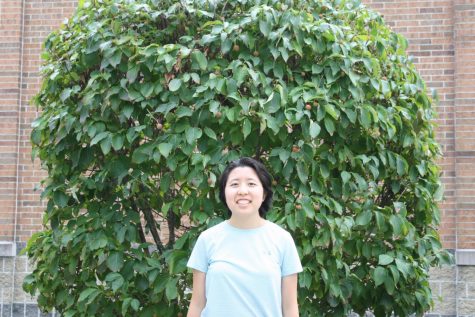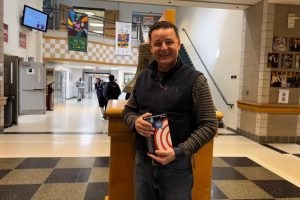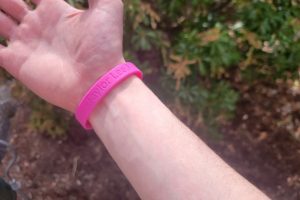Andrew Yang addresses job loss and Universal Basic Income
February 4, 2020
On Sunday, January 12, New Hampshire residents gathered in Londonderry High School to hear Democratic presidential candidate Andrew Yang talk about the most pressing issues facing America and how he would ameliorate them as president.
The New Hampshire Democratic Primary will take place on February 11. Yang has qualified for the February Democratic Debate following a recent poll. He currently polls at around 4.6% nationally.
Yang, who comes from an entrepreneurial background, started the nonprofit Venture for America in 2011. Venture for America creates jobs in big cities to help strengthen local economies. Because of his work, Yang self-describes himself as a “job creator who understands the economy” rather than a “career politician.” As a result, he believes that he can truly act on problems such as job creation, as he believes that the government “isn’t willing to take the necessary, bold steps.”
Yang explained that he felt that although some cities seemed to be doing better than before, there is a discrepancy in success between different parts of the country.
“And over the next several years, running this non-profit, [I] helped create several thousand jobs in 15 cities around the country […] Unfortunately, I had this sinking feeling traveling around the country […] that things were getting worse, not better, in many places. And I felt like when you flew between St. Louis and San Francisco or Michigan and Manhattan, it felt like you were crossing dimensions or decades or ways of life, and not just a few time zones,” Yang said.
Yang points to automation as one of the main problems facing America. Many of the jobs once held by humans can be held just as well by machines. In terms of job unemployment, Yang argues that the effect will be detrimental to many workers across the country.
“We all see the self-serve kiosks at the CVS and the grocery store and the fast food restaurant, but the changes are more pervasive and subtle. […] What is this going to mean for the two-and-a-half million Americans who work at call centers right now making $10 to $14 an hour? […] There are three-and-a-half million truck drivers in our country. […] If you doubt that the robot trucks are coming, a robot truck just transported 20 tons of butter from California to Pennsylvania two weeks ago with no human intervention. […] What will the robot trucks mean for the 3 and a half million truckers and the 7 million Americans who work at truck stops, hotels, and diners that rely upon the truckers getting out and having a meal everyday? […] We’re in the midst of the greatest economic transformation of our country, what experts are calling the fourth Industrial Revolution. […] It’s transforming our way of life in fundamental ways,” Yang said.
Despite the Yang’s opinion that artificial intelligence is overtaking people’s jobs, when Yang confronted the government with the evidence he had collected, it seemed that not many officials were willing to confront his argument. Many dismissed the idea altogether, or mentioned that they should look into it. Few also mentioned the need to help the jobless find their passion in other fields. However, he realized that simply re-educating was proven wholly ineffective.
“So, I go to our leaders in D.C. and I say, ‘What are we going to do to help our people manage this economic transformation?’ […] The main response I got out of D.C. were ‘Andrew Yang, we cannot talk about this.’ […] ‘We should study this further.’ […] ‘We must educate and retrain all Americans for the jobs of the future.’ […] So I said, ‘Hey, I looked at the studies.’ […] The success rates were between zero and fifteen percent. […] Of the manufacturing workers in the midwest who lost their jobs, almost half never worked again. And of that group, half filed for disability,” Yang said.
Specifically, Yang mentioned that the decline in life expectancy is a serious indication that these problems need to be fixed, especially in a strong country such as the U.S.
“You then saw […] suicides and drug overdoses in those communities to the point where America’s life expectancy has now declined for the last three years in a row. You know the last time America’s life expectancy declined three years in a row? […] It’s the Spanish flu of 1918, a global pandemic that killed millions. It is highly unusual for the life expectancy to ever decline in a developed country. It ordinarily keeps going up and up because you are getting richer, stronger, healthier,” Yang said.
Instead, Yang offers another solution as the way to help Americans manage this drastic shift in jobs: the Freedom Dividend, otherwise known as Universal Basic Income (UBI). UBI guarantees that all U.S. citizens over the age of 18, regardless of socioeconomic status, will receive $1,000 monthly. This system is made to benefit everyone, according to Yang, especially for people such as stay-at-home moms, who are not paid for the work they do to raise their families.
Although some may seem skeptical to the idea of receiving $12,000 per year from the government, Yang explains that this proposition is not completely new. According to Yang, historical figures such as Thomas Paine, author of Common Sense, and Martin Luther King Jr., one of the most prevalent political activists of the 20th century, have both endorsed such plans. More recently, Yang talks about recent political leaders and states that have considered this policy.
“A thousand economists, including Milton Freedman, one of the fathers of modern economic theory, endorsed this plan in the ‘60s, passed the U.S. House of Representatives in 1971 twice under Nixon—it’s called the ‘Family Assistance Plan’ and would have guaranteed an income for all Americans. And then eleven years later, one state actually passed a dividend, where now everyone in that state gets one and two-thousand dollars a year, no questions asked. And what state is that? Alaska. And how do they pay for that? Oil. And what is the oil of the 21st century? Data, technology, AI, self-driving cars and trucks,” Yang said.
In order to pay for the Freedom Dividend, rather than taxing the wealthy, Yang offers the solution of taxing companies.
“Amazon alone is soaking up $20 billion in business every year. How much did Amazon pay in taxes last year? Zero. […] We have to make sure that we are getting our fair share from the biggest winners of the 21st century economy. If we get our fair share on every Amazon sale, every Google search, every Facebook ad, […] we can easily afford this thousand-dollar dividend in our hands. After we spend it in our communities, it creates all sorts of new economic growth, right here in New Hampshire,” Yang said.
In the end, Yang argues that using the economy to power the people, rather than letting the people power the economy, is the right way forward.
“We have allowed ourselves to get collectively confused that economic value and human value are somehow the same things, when they are not. We have to say that the machines work for us and it’s not that we all work for this giant capital efficiency machine. This is the way we humanize our economy and get it working for us. This is how we’re able to look our kids in the eyes and say that their country loves them, their country values them, and their country will invest in them for real,” Yang said.







